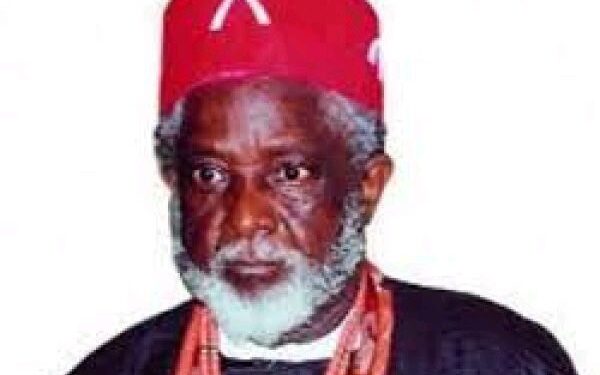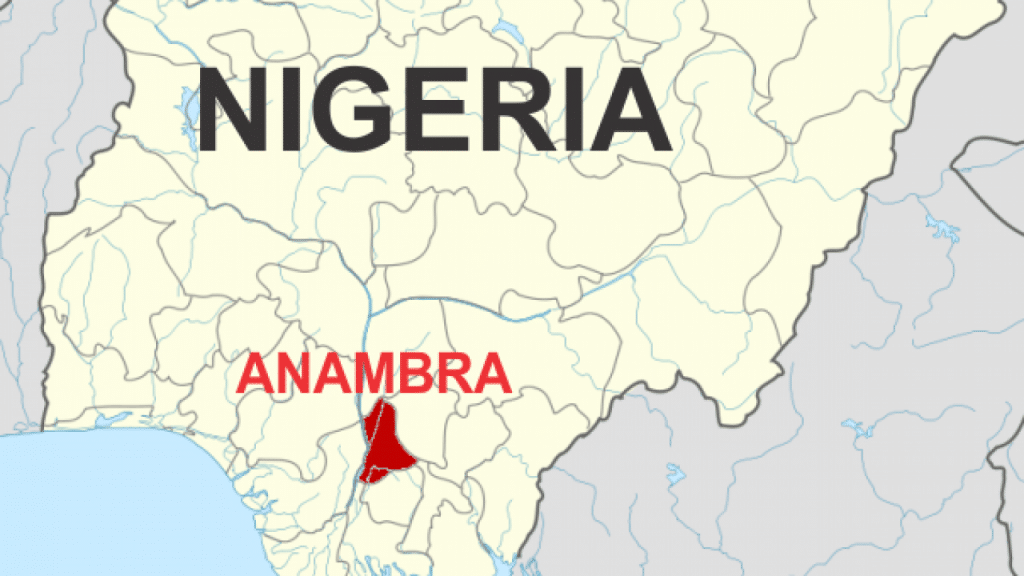Igwe Laz Ekwueme, Eze Ijikara II of Oko is one of the foremost traditional rulers in Igbo land. In this interview Igwe Ekwueme spoke about the problems facing the traditional institution in Anambra State, the reason he has not been able to celebrate his Ofala festival for the past 20 years, as well as the infamous gully erosion that is threatening his Palace and how he chose to study Music.
Igwe, what was the past like?
I was born in Oko. My father was a church teacher. We were four boys and three girls. The girls died in infancy. My elder brother died at young age and we were left with three boys. One was Dr. Alex Ekwueme, I am in the middle and my younger brother is Obumneme Ekwueme who is a surgeon at the University of Nigeria Teaching Hospital (UNTH), Enugu.
Ekwueme, our grandfather, had five wives and my mother was the second wife. When the church came, they went to the traditional rulers, and asked them to send their children to schools. My grandfather felt that the idea of Christianity didn’t vary much from the traditional beliefs. So he sent his younger children to school. So, my father and the other younger children went to school and that was how Ekwueme became an educated family in this area.

My late uncle went to DMGS, Onitsha, my eldest brother went to DMGS, Alex went to Kings College and I went to Government College, Umuahia. Obuneme went to Igbobi College, Lagos. Alex later went to the USA, to study Architecture and many other degrees in seven different subjects. I went to England to study music and my younger brother went to University College, Ibadan and collected 90% of prizes in Medicine there.
In Ekweme family we have 14 Medical Doctors, seven Lawyers, 11 Engineers, four Pharmacists, eight Architects. We have other professions in the family, including Education, Accountancy and even Religious priest. It’s a large family and God has blessed us in many ways. We were not endowed with money, but we were lucky to have acquired education. Alex went to America on scholarship, I went to England on scholarship, my younger brother after Ibadan went to England for further studies on scholarship. My first son is an Architect and his first son has 1st Class Honours in Engineering from a University in England. We are a religious family of Anglican Church, courtesy of my father.
What inspired you to study music at the time you did because music was not a popular course then?
I went to study music almost by chance. I was much more interested in Drama. As a young person and good looking, I had the ambition of being a film star. I couldn’t take lessons in Drama in Nigeria although there were competitions, like the Festival or Arts and I got prizes in many of them. But I got a Federal Scholarship to study music in England. While studying music, I did not leave Drama, Literature and other aspects of human creativity, including Fine Arts. I conducted choirs in England and America and sang in many churches abroad, including in Jewish Temple churches.
As the first Professor of Music in Africa, what did you do to change African Music?
I made my contributions in whatever way I could. Music is either you write it, play it or practice music. Or you teach music. I have composed quite a few pieces of music, both local instrumental, choral and solo. I have set up choristers in various parts of the world and conducted choral singing in many places. I have published over 20 books in various branches of music and Drama and other aspects of education. That was why I was awarded the Nigerian National Order of Merit (NNOM).
What was your proudest moment as a young man?
It could be the fact that I studied music up to the level I did because most Nigerians did not get up to that level. To have a B. A Mus in England in those days was something very big. And I went to teach at University of Nigeria, Nsukka as a young Lecturer for two years and I got another fellowship to go to America for Ph.D. I conducted the choir at St. Barth’s Enugu at the age of 20 years.
As one of the foremost traditional rulers in Igbo land who everyone would be seeking your views on issues concerning culture and tradition, can you tell us the history of traditional institution in this part of the country?
In other communities in Igbo land, the ways of life revolve around the traditions in Anambra State. Anambra is a community of people who cluster together and how they came together is not quite clear. Every village or community has its own story or narration. Some say they came from Igala land, others say they came from Benin. But nobody is sure of anything. But there was a traditional medicine man called Ezechina who travelled and lived in Benin for many years and the Oba handed him many things. However, an Oba who didn’t like Ezechina mounted the throne and Igbo people had to run away and they came back to the East where they were originally from. There were other stories about origin of the Igbo. Many believed that Nri was the source of Igbo land because they performed rituals. Anywhere there was trouble, they were called to perform the ritual and often acquired land there. So they had a lot of influence spiritually and materially. So many Igbo communities had ancestries in Nri. Apart from Arochukwu, there is hardly any part of Igbo that doesn’t have a trace to Nri. Agu Ukwu, Enugwu Ukwu, Nawfia and Enugwu Agidi are sons of Nri. So, many people migrated from many places to settle where they are presently.
In Oko, for instance, because of the growth of the town due to the educational establishments, the markets, the industrialization, many people migrated to the town and have, as it were, become indigenes of Oko because this is where they were born. Many people from Nsukka and Abakaliki have settled here and they enjoy all rights and privileges.
What have been your challenges as a traditional ruler?
It’s somewhat a checkered history because there has been a tradition of hierarchy in Oko. We have six villages in Oko and there is also seniority within the villages. Ezioko is first and if something is being shared, Ezioko will take first. In Ezioko, there are certain quarters Umuomodo, Etiti, Okoto in that order. If you come to Umuomodo, Umuezeokwe must take first. Traditionally, Umuzokwe has played the leading role in kingship.
My uncle whom I succeeded was Igwe Ekweme the III. Ezeoko produces the king, but our people are amending the constitution which may prevent Ezioko from producing the king. I am not worried about who comes after me. When my uncle who was the Igwe died, I gave a gap before I assumed the office. My elder brother, Dr. Alex Ekwueme, would have been the one but he asked me to take over because he was involved in politics. People were lobbing him but he said I should take it. It has not been easy and the challenges have been enormous. The Igwes no longer command the respect they used to enjoy. All the rights and privileges they used to enjoy are no longer there. Instead, they come to see what they can get from you.
One of the challenges I had faced came from the authorities of the Federal Polytechnic which was established by Dr. Alex Ekwueme which many people made a money spinner for themselves. Instead of using it to develop academics and the town, they see it as a gold mine and it had caused a lot of problems.
My last Ofala was over 20 years ago because of disunity in the town, but we will have one in January, 2025. Even annual Iwaji could not hold for a long period. However, we are now in a period of restoration.
.How has your position as a nollywood actor, an academician, a musicologist and a traditional ruler, been influencing your person?
Part of the problem is that I am a person interested in too many things. In fact, it retarded my academic progress because if I had concentrated on academics, I would have moved faster. I was involved in music, drama, sports. I was a champion boxer, I was in martial arts. I did sciences in higher school and ended up studying music because I got a scholarship. I was even a lay reader in the church in 1956 and a choir master of the Old Niger Diocese which included Benin, Owerri, Enugu and I took St. Barths choir Enugu to competitions and won laurels. My interest in music was because I was taught music at Government College, Umuahia by a white man.
When you are in a film set, do those you act with give you respect as a traditional ruler or just treat you as an ordinary person?
Well, we are there to play our parts irrespective of who you are. If you are asked to play the role of a slave, you have to do it even if you are a king. But outside the set, you get your respect, although many of them would think that because you are a king, you should give them something. The important thing is for one to do his part and that is what drama is all about. But because I happen to be a traditional ruler I played the role of Monarch in a lot of films. But I started doing that even before I became a traditional ruler. But generally I had played the role of a priest, traditional ruler, businessman. They gave me affluent positions because they want someone who can interpret well and come with dignity and without pretence. Yes, it does affect the part one plays, but not in all cases.
Do your colleagues in the Traditional Rulers Council complain about your acting films?
Yes, many of them condemn my acting on set and say it’s a misconduct on my part. But I pity them because it is lack of education on their part. I practice a profession like others. You cannot tell an Igwe who is a doctor not to practice medicine or a lawyer who is an Igwe not to go to court. Some of the Igwes said I should not be entertaining people. Anyway, I am now too old to take active part in acting.
Does being a brother to one of Nigerian’s foremost politicians, Dr. Alex Ekwueme, affect your governing Oko as a traditional ruler?
Naturally some people felt that I was carrying on as an aristocrat. I come from a Royal family and there is nothing people can do about it. They felt I was like that because my brother was a Vice President, but that was not true. If for anything, I even suffered because of it. There was nothing I got that others did not get. I got NNOM on merit, and not because I was Dr. Alex Ekwueme’s brother. And I am a first class monarch. Chukwuemeka Ike later got NNOM. There might have been advantages I enjoyed for Alex being my brother, but there seemed to be more disadvantages. There were things I was entitled to but people thought I already had them because of my brother. People won’t offer you gifts because they think you are rich. People assume that I am rich, but I am not. I didn’t have money. Someone might propose you to be chairman of something, but some people world say, oh he doesn’t need it. For instance, why should I not have been Vice Chairman of Anambra State Traditional Rulers Council? Chukwuemeka Ike who became a traditional ruler seven years after I had been on the throne, became the Vice Chairman. Even when Ike passed on they gave it to somebody else. I didn’t have to request for it.
The State Traditional Rulers Council appears to be in limbo at the moment. What is happening?
The cause of the matter was that past governments selected members of the traditional rulers council. For instance we are about 200 traditional rulers in Anambra State, but government selected only 60 for the state council. The three senatorial zones have zonal forum and Local Government council and everyone belongs to them. But the central one was selected by the governor and he handpicked the members. For example, Ekwusigo local government has only four towns and three from there are members of the council. Nnewi North is one town LG, Onitsha is a two- town LG, Orumba North has 16 communities and by the time Ike died, I was the only member from Orumba North local government and the governor should have appointed the Deputy Chairman from Orumba North. Awka South had six patrons, and Orumba North had no patron. Igwe Aguleri passed on and his successor was made a patron on assumption of office. That sort of thing was something beyond the traditional rulers. Last year, the governor told us that he found out that the law provides that every traditional ruler should be a member of the state traditional ruler’s council and that the law should be amended. But that amendment never took place. It’s over a year and nothing has happened. Many people are displeased about it and the allowance we get is off. We were sitting two times a month. The chairman was getting N100,000, the grand patron gets N75,000, the secretary gets N50,000, the Vice chairmen get N50,000 while the rest get N30,000.
So many of the traditional rulers are unhappy because, for example, if you have to travel from Owerri Ezukala to Awka for a meeting, you need your transportation reimbursed at least, especially when many of the traditional rulers do not have other sources of income. Some of them who are successful businessmen don’t care. So many have been disgruntled and that is part of the problem.
Culturally speaking, are there things you think Igbo people are not doing right?
Indeed there are things we are not doing right. We misplace our priorities and emphasizing on money all the time. We seem to have abandoned honesty, truth and justice, fair play. Oko has been somewhat lucky that there is no battle between the traditional ruler and the PG but many communities have that problem. I am not someone that goes about seeking power. They battled me in the past and set traps and even tried to kill me. But God has been on my side. I believe that with the Ofala we are planning, a lasting peace will return in Oko after 20 years. We couldn’t celebrate Ofala because of lack of peace. The forthcoming Ofala is to cement peace in the town.
The gully erosion had been a problem in Oko to the extent that your palace is also being threatened. What is the situation?
The problem is still there, not because the government is unwilling to do something about it, but because government is unable to do anything. It is an enormous problem. The World Bank had been approached and they sent a team through NEWMAP which did a lot of survey here. If you walk behind this palace you will see it. We are only living by prayers and keep hoping that something will be done, but nothing has been done. There is hope that the governor will do something about it and he had taken steps to do something about it. It is not just Oko as many other communities are affected.
Governor Soludo has banned sand mining in Oko and other communities because it causes gully erosion. Are your people still doing it?
Some people are still doing it clandestinely and some of them have been arrested. But those who are caught face the consequences.
If you are asked to name one thing you want government to do for your community, what will that be?
Erosion and roads are our main problems. There are parts of Orumba North that are inaccessible such as Ndi Okolo, Ndi Okpalaeze because of gully erosion. We will be very happy if the problem of erosion is tackled






